Harvard Graduate Students Redefine Service for the 21st Century at 11th Annual Social Enterprise Conference
|
BOSTON AND CAMBRIDGE, MA — Nearly 1,400 people flocked to the campuses of the Harvard Business and Harvard Kennedy Schools for the weekend of February 27th to attend the 11th annual Harvard Social Enterprise Conference, the largest student run conference of its kind. The conference theme, "New Frontiers: Redefining Service for the 21st Century," challenged the participants - including numerous students, alumni, practitioners and leaders in the field - to use the conference as a means to explore the role of service in their own lives and in the business endeavors they undertake. 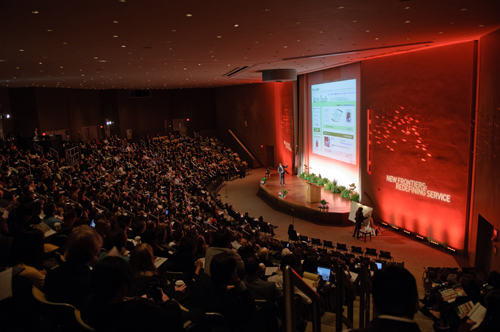 Premal Shah, President of micro-lender Kiva, gave the Sunday opening keynote
Photo: Ho Yin Au
Premal Shah, President of micro-lender Kiva, gave the Sunday opening keynote
Photo: Ho Yin Au
For the first time in the conference's history, a Saturday evening event launched the weekend with a keynote delivered by the Goodwill Ambassador for the World Health Organization, Liya Kebede, who is also an International supermodel and founder of the Liya Kebede Foundation. Kebede called participants to take action: "What happens to problems that we think are too big? They just get bigger. Don't listen to people who say it's impossible, just prove them wrong. If you think too much about it, you won't do it. You have to jump, and then swim." 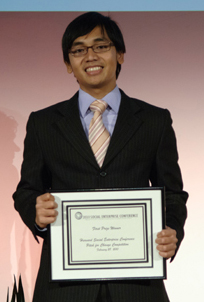 Pitch for Change First Prize Winner
Pitch for Change First Prize Winner Organization: Ruma School: Harvard Business School Photo: Ho Yin Au Following Kebede's keynote, Mike Havard, Vice President of Marketing for Newman's Own, Inc welcomed participants at the first annual Saturday evening cocktail reception. A forum for practitioners and students to mix and mingle, the reception further strengthened the bonds within the social enterprise community. "We're here to learn from you, but if there's one thing that you can take away, it's to go for it," said Havard. "Newman's Own wasn't supposed to succeed…no one thought that a company that gave all of its profits to charity could." The energy from Saturday evening gave way to a full day of events on Sunday, including an opening keynote address by Premal Shah, the President of Kiva, an internet site that facilitates micro-lending. Shah spoke about the importance of "the first follower" by showing a video encouraging participants to "courageously follow, and have the guts to be the first person to stand up and join in." Later, in a one-on-one interview, Matthew Bishop, U.S. Business Editor and New York Bureau Chief of The Economist, asked U.N. Secretary-General's Special Envoy for Malaria, Raymond G. Chambers, about his career path from private equity to service. "I just assumed growing up poor that if you had your family, your health, friends, and financial independence, you'd automatically be happy…but I'm absolutely convinced that the most direct route to happiness is in service to others," Chambers said. 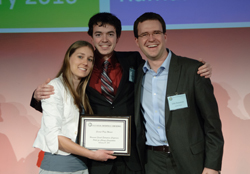 Pitch for Change Second Prize Winner
Pitch for Change Second Prize WinnerOrganization: Angaza Design School: Stanford University Photo: Ho Yin Au In addition to the keynote addresses, participants elected to attend several of the 29 diverse expert panels covering a wide array of topics, including: disaster management, microfranchising, social branding, healthcare, and the role of technology in social impact and development. Given the recent tragedies in Haiti and Chile, the panel "Preparing for 21st Century Disasters," moderated by Dutch Leonard, the George F. Baker Jr. Professor of Public Management at Harvard Kennedy School and Eliot I. Snider and Family Professor of Business Administration at Harvard Business School, was particularly popular. The Administrator for the Federal Emergency Management Agency, W. Craig Fugate, joined executives from Walmart and the Red Cross for a discussion on the evolution of disaster management. 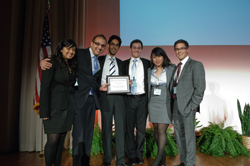 Pitch for Change Third Prize Winner
Pitch for Change Third Prize WinnerOrganization: DrinKup School: Schulich School of Business, York University Photo: Ho Yin Au "Disaster management wasn't built with the idea of a network in mind, but it is how it is evolving. And in order for the network to be successful, it has to empower people to do what they're good at in the first place - that is the solution," said Fugate. The conference not only challenged participants to begin discussing solutions to imminent social, environmental, and economic issues of our time, but provided the means to take action. Students took part in a careers workshop and career fair, and student teams faced off in the Pitch for Change Business Pitch competition, which awarded four winners over $12,000 to start their own social enterprises. The first prize winner in the 2010 Pitch for Change was Aldi Haryopratomo of Harvard Business School with Ruma. Lesley Silverthorn, Bryan Duggan, and John Krzywicki of Stanford University received second prize for Angaza Design. DrinKup, presented by Afzal Habib, Adam Camenzuli, Sameer Gulamani, Bonnie Lau, Sarah Kaytal, and Nathan Jenkins of the Schulich School of Business at York University, was awarded third prize. 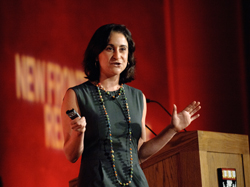 Abby Falik (MBA 2008), founder of
Abby Falik (MBA 2008), founder of Global Citizen Year, speaks at the Social Enterprise conference Photo: Ho Yin Au Former Pitch for Change winner, Abby Falik (HBS 2008) returned to share her thoughts as founder of Global Citizen Year and winner of the Draper Richards Fellowship during a series of student vignettes titled "Why Do I Serve?" Falik, whose non-profit selects American high school seniors for a "bridge year" educational experience and apprenticeship in Asia, Africa, or Latin America, explained, "Since I stood on this stage two years ago…every waking hour has been committed to bringing Global Citizen Year to life…I serve because by awakening others to their own potential and their potential to be agents of change in the world, I become more alive each and every day." Closing remarks were provided by keynote speaker Sonal Shah, Deputy Assistant to the President and Director of the White House Office of Social Innovation and Civic Participation, who challenged participants to "create movements, redefine service to solution, take more risk, and make a service mindset. Government alone can't solve these problems, business alone can't solve these problems, civil society alone can't solve these problems; it requires a combination." 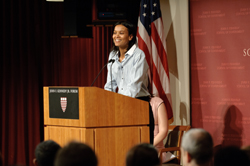 Liya Kebede, Goodwill Ambassador for
Liya Kebede, Goodwill Ambassador forthe World Health Organization Photo: Ho Yin Au Monica Belsito (HBS 2011), co-director of media for the conference, said of the conference mission, "This generation of MBA students is charged with the invigorating challenge to create socially responsible, environmentally sustainable, and economically viable enterprises that make a positive difference in the world. Here at Harvard, our graduate student community gathered this weekend to do just that." The Harvard Social Enterprise Conference demonstrated that social enterprise remains top of mind for leaders, both current and future, across the country as they tackle the new frontiers of the 21st century. About the Harvard Social Enterprise Conference Note: HBS Class of 2011 students Emily Wren and Monica Belsito wrote this press release and served as media contacts for the conference. |
About Harvard Business School
Harvard Business School, located on a 40-acre campus in Boston, was founded in 1908 as part of Harvard University. It is among the world's most trusted sources of management education and thought leadership. For more than a century, the School's faculty has combined a passion for teaching with rigorous research conducted alongside practitioners at world-leading organizations to educate leaders who make a difference in the world. Through a dynamic ecosystem of research, learning, and entrepreneurship that includes MBA, Doctoral, Executive Education, and Online programs, as well as numerous initiatives, centers, institutes, and labs, Harvard Business School fosters bold new ideas and collaborative learning networks that shape the future of business.
